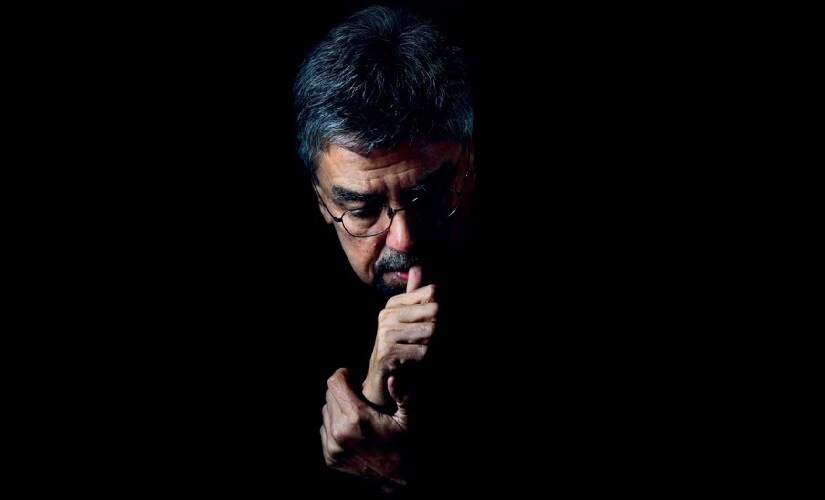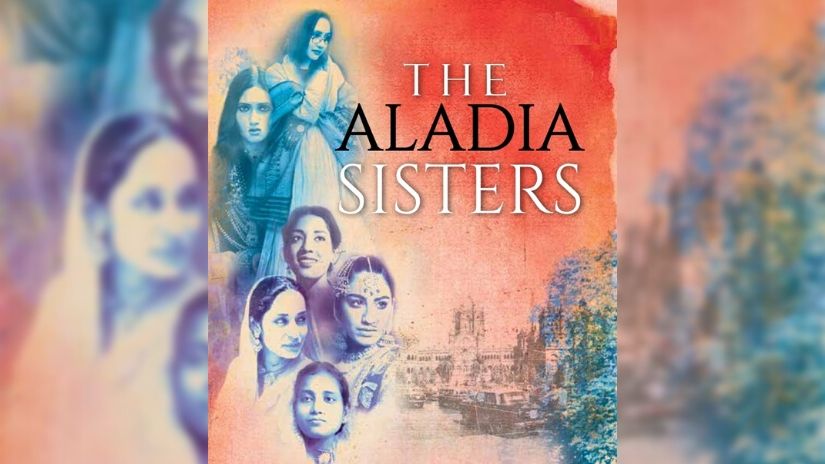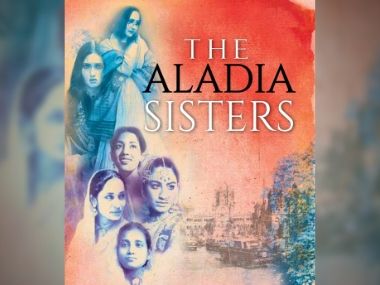Traversing the era of the British Raj, the Partition and India’s Independence to the here and now of the Internet millennium, the story of six sisters who belong to a patriarchal Muslim family is investigated by a journalist. Before coming of age, the sisters had run away in the deep cover of the night from a Haryana village to define their lives and destinies. Thus began an undeclared game of may-the-best-sister win. Their to-do lists comprised earning money, expressing inchoate talents in the arts, hooking the richest husbands, and raising the next generation right. Through confidences and vignettes, updates and interviews, the Mumbai journalist travels between Delhi, Ajmer, Mount Abu and London to recreate the narrative of a confederacy of women who dared to break rules. “The idea of writing a book on six sisters was like a continuum of my film trilogy for Shyam Benegal — Mammo (1994), Sardari Begum (1996) and Zubeidaa (2001),” Khalid Mohamed tells Firstpost_. With_ The Aladia Sisters_, Mohamed says, he wanted to “compose a story which took in elements of so many Muslim women” he has met, not only in Mumbai and Delhi but also many smaller towns in India. “There’s a little element of everyone. Also, I couldn’t write everything factual from the start, so it is a blend of fact and fiction,” he adds._ This excerpt from The Aladia Sisters, written by Khalid Mohamed, has been reproduced with permission from the publisher, Om Books International. [caption id=“attachment_7905301” align=“alignnone” width=“825”]  Khalid Mohamed. Photograph by SL Shanth Kumar[/caption] *** The Embroidered Brothel Quite characteristically, the Humshira was cavalier about the repercussions of the escape from Qalayat. “They were our father and mother. They brought us into the world. We owe our lives to them,” was the regret which Rehaan waited to hear, but never did. Surely when they became mothers themselves, they could have regretted the escape, the abandonment of their parents. A droplet of apology would come from Fayazi Ma in a self-righteous cadence, “Why do you cause me pain? Parents are parents, but we didn’t return to Qalayat when they passed away within a week of one another. Like their lives, their deaths were as ridiculous. Our abba, Saundha Bhai, had a rotten tooth. His wisdom tooth just fell off in his mouth and he swallowed it, by mistake, I should hope! Some infection or the other spread, and he died at home. Ammi Iddanbi developed a fever soon after. She cried her eyes out. Which woman wouldn’t? Her tears had always scored over her laughter. I cannot remember the sound of her laughter. We were told by our brother, Murad, that she was confined to bed. She ignored the roots, herbs and tonics prescribed by the hakim. Our procreators were buried close to each other. They must still have so many conflicts to sort out in the other world,” she tailored her version of the burial. As an afterthought, to absolve herself of evil speak, she muttered, “Allah unko jannat mein mehfooz rakhen. (May Allah safeguard them in heaven.) Why must you remind me? Are you subjecting me to a police inquiry?” He couldn’t see himself in a police uniform; he didn’t have the physique to carry off the khakis. At most, he could see himself in a lawyer’s robes. In hindsight, the schoolday aspiration of fighting petty or paramount cases in the courtroom for those who couldn’t afford lawyers struck him as naïvely idealistic, and as fatiguing as the three to four years required for an LLB degree. Miscellaneous and unsuitable jobs attempted against his principles – what use were they? – his schoolfriend’s father was on the board of interviewees for the post of trainee journalists at The Daily Chronicle, where he would be taught to climb the ropes either of a sub-editor or a reporter at the daily newspaper. No-brainer. Sub-editing would entail cleaning up reporters’ copies. Let sub-editors spruce up his copy if he could learn to dash out those snappy news paras linked by connecting bridges. The brief for a cub reporter was to seek information, verify it and precis it into a report, which the training officer said should make sense to an extra-terrestrial. “Suppose ET lands on earth and picks up The Chronicle, it (sic) should understand what you’ve written. We’re taking it for granted that ET can read…English,” he’d wait for our approving smiles. Over a decade later, the twaddle during the training had transformed Rehaan into a reporter on a closer-to-the-bone ‘human-interest’ trudge, dedicated to detecting why his extended family was the way it was, why the Aladia women had charted the family manifesto which had seeped through four generations, why the men became puppets on their petticoat strings. The sisters’ history, or whatever he could configure, testified that more than their sexuality, it was their native intelligence, in a broad generic sense, which they used as their ammunition. Also, the six were locked in a lifelong competition. Let’s see who wins – rivalry must have festered within the Humshira. In their own right, the six must have been achievers – or losers depending on your perspective – in variable degrees. In any case, achievement is overrated, accompanied as it is with unwieldy baggage. Deceit, manipulation and ambition, checked or unchecked, must have been their modus operandi. At home, among his books, movie and rock music posters, Rehaan was knotted up. He couldn’t be treated as a child, dammit. Go ahead, untie yourself, apply if you can the words of the Scottish psychiatrist RD Laing, “Creative people who can’t help but explore other mental territories are at greater risk, just as someone who climbs a mountain is more at risk than someone who just walks along a village lane.” Come, come Rehaan, don’t kid yourself. Creative people? Don’t kid yourself; you’re not in that club. Journalists report impassionately. They talk to those who’re superior than themselves. They hack out inappropriate questions for appropriate answers. Interviews are stimulating, he could tell, only when the interviewee reducts himself, becomes a conduit of information and comments. The approach with Mumtaz Chaudhran wasn’t working. The option was to go through a far more aggressive route by painting her into a corner. No, no that would lead to self-loathing. He would become like those hectoring-screaming TV news honchos, repulsive, their sound and fury signifying self-aggrandisement. Maybe a truth-or-dare challenge could be the modus operandi. To dare wouldn’t take any effort; the truth could be wounding. Endure it or back off. There were no leads left. Memorabilia was scant, no photographs of the sisters clicked together. There were some letters, in Urdu, frequently beginning with the endearing ‘Pyaari Aapa’, followed by a quaint, ‘digar haval yeh hai’ (my present state of being goes like this). The letters shifted gears, harped on recriminations and verged on abuse between the sisters. The Qalayat home they had abandoned was the bone of contention. The hovel had been reconstructed by their brother, Murad, who had lived up to his name – a wish come true. The property in the village could fetch them a substantial sum, not sufficient to alter their lifestyles though. No matter. Here was a fold of land each one of them were entitled to. The brother couldn’t usurp it. He had monopolised Abba and Ammi the moment he was born. Surely that was treacherous enough. Mumtaz Chaudhran didn’t care about the law and its niceties. She quibbled that since she was the eldest, the ancestral property belonged to her exclusively. In that spirit of bravado, she contemplated a courtroom showdown. Legal proceedings were inevitable. Murad who appealed that he was the only male heir, quoted the sharia. Threats of a court case would be as slow as the hands of a clock following their adamant orbit. The other sisters, it had to be presumed, claimed a slice of the Aladia land as well. Irresolvable trouble had persisted over decades. Allarakhi, Amina and Ferozi couldn’t be assertive; they were faceless by their absence. Rehaan couldn’t recall seeing them in person. Their names would crop up and wilt. Mumtaz’s share was at long last bought off in a flourish of generosity by Jameela and Fayazi who had ganged up on the land rights. The Chaudhran was handed over a by-now- barely recallable sum in thousands, and given a loan as well, but had not yet imprinted her signature or fingerprint on the legal documents. “What money are you talking about, bitches?” she’d go amnesiac. [caption id=“attachment_7905311” align=“alignnone” width=“825”]  Cover of The Aladia Sisters by Khalid Mohamed.[/caption] A morning conclave had been called at the Chaudhran’s old central Bombay house, at the Kennedy Bridge kotha. Furious with the Chaudhran’s wiles and memory loss on the thousands of rupees handed over to her, Jameela, so unlike her, had rained expletives and then flung a brass ugaaldaan at Badi Aapa, hitting her on the forehead. Blood had cascaded from the Chaudhran’s forehead to her eyes and cheeks. Rehaan rushed to his grandmother and held on to her waist tight, imploring, “Ma, let’s leave.” A slap resounded on his right cheek. Fayazi Ma wasn’t to be fazed; a child’s petulance wasn’t to be tolerated. “Go and sit in the other room till we’ve finished,” she said firmly. “This is a matter between us sisters. You’re just a child.” Child equals moron. Rehaan was led out by Jameela, consoled with a flummery of endearments, and latched in a room at the far end of the Chaudhran’s kotha. He wept noisily. When the door was unlocked, Jameela was applying a turmeric-paste bandage on Mumtaz’s forehead. Fayazi was lathering a paan. This was getting farcical. Mumtaz and Jameela hugged each other. Business-like now, Fayazi Ma said to both, “Remember we love one another; quarrels are momentary.” “Why did you slap me, Ma? I’m hurting,” Rehaan dared to wince. She snorted, “Sisters are sisters. You will never know what that means… I rue the day your mother gave birth to you. It was disappointing to see my first and only grandchild…a son.” “You love these women more than you love me?” the boy asked precociously. “Love between us sisters can’t be measured,” she said, as if she was drafting the opening line of an ode to sisterhood. The cause and effect theory was alien to the sisters. Endlessly through his adolescent years, the grandson had wondered whether they were mercurial? Temperamental beyond repair? Wrong buttons were being pushed by him here. The closest guess he could hazard was that they were beyond comprehension, particularly Mumtaz, Jameela and Fayazi. The other sisters, Allarakhi, Ferozi and Ameena couldn’t be like them. They must be made of the same clay in deceptively gentler colours, reminiscent of Amrita Sher-Gil’s faces of rural women ‒ stoic but aware that they were sitting for a portrait. In the imagined portrait, Allarakhi was dumped in a remote section of the canvas, and the demeanour of Ferozi and Ameena could have been that of concealed amusement. If Ameena had participated in that meeting over the property dispute, he imagined her lost eye wouldn’t have reduced her vision, but she would have backed off. Her sisters saw Ameena as impaired, a kaani, cross-eyed. She wouldn’t change their perception. She wouldn’t protest. It was only a matter of time. Her silence would have unnerved the sisters; she couldn’t be cheated of her due status in the tangled grid of the Aladia sisters either. If she and Ferozi had been present on the scene, they would have been disappointed that Mumtaz hadn’t been hurt more grievously by the hurled ugaldaan. As soon as he visualised the conclave ending, he imagined the pious Allarakhi excusing herself – it was time for her afternoon namaaz. She would appeal to Allah for sanity, unity among the sisters and above all, her rightful share of the property. In a rare moment of candidspeak, Fayazi had told him about Allarakhi. She owned a minuscule shop in a Muslim-dominated mohalla, which sold sweets, biscuits, bidis, cigarettes and matchboxes. The shop’s monthly take was paltry. Often Allarakhi didn’t know where her next meal was coming from. She had to live; she couldn’t subsist any longer, moving from the dank corners allocated in the kotha by the Chaudhran. Rehaan could see Allarakhi, if she had been there, recoil on seeing a child slapped for no fault of his. She would have cupped her hands and breathed on his face to soothe it, and would have berated Fayazi, “Don’t ever do that again. It is not correct to raise your hand on a child.” The slap, she would have fumed, was on her face. Fishing out a few rupee notes from within her blouse, Allarakhi would have said magnanimously, “Buy yourself some sweets from a big store. They have lemon drops and bull’s-eyes imported from England also. This grandmother of yours is mean; she can’t appreciate what she has.” And Fayazi Ma would have silenced her, “Mind your own business. I’m raising this boy the way he should be raised. Get that in your foolish head, you troublemaker.” Allarakhi would have laughed drily and prayed on a folded red-and-gold jaannamaaz which she must have carried with her wherever she went. He was lapsing, hypothesising, breaking his word that he would stick to reportage. This Allarakhi was Rehaan’s creation, endowed with a tender heart. He would have liked to learn Urdu at the feet of Allarakhi Nani. She was the sister he adored; she was illusory. His Allarakhi lived in a nowhere sky with diamonds, an unseen face he associated for no reason with the elegance of the Urdu language. It was a lacuna. Rehaan was left uneducated in the adab of Urdu, overloaded with the school’s curriculum of English, Hindi, Gujarati or Marathi, and for a year, Latin – from the textbook Ora Maratima – which he could never comprehend. Lessons in reading the Quran from a maulvi had proved cumbersome. Fayazi Ma stopped the lessons. She contended, school first, faith later. “At least learn the kalima by heart. That’s the least you can do to be a good Muslim.” Easier said, easier done. Still, ignorance of the tenets of the Islamic faith was a void. Whenever the sisters prayed, they struck him as women of God – they were being watched, they were under the Almighty’s custody. The boy would recite the kalima to be in line.
The Aladia Sisters traverses the era of the British Raj, the Partition and India’s Independence to the here and now of the Internet millennium to tell the story of six sisters who belong to a patriarchal Muslim family.
Advertisement
End of Article


)
)
)
)
)
)
)
)
)



